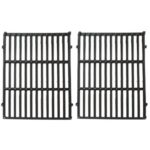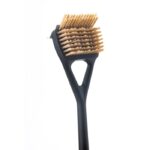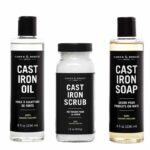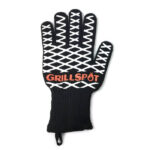Rusty grill grates are like rain on a barbecue parade—they sap flavor, raise safety flags, and fast-track you to replacing gear you’d rather keep sizzling for years. Whether you’re firing up gas burners or piling charcoal briquettes, learning how to keep grill grates from rusting is the ticket to juicy, crowd-pleasing meals instead of dinner-table duds. And the best part? A rust-free setup takes far less effort than you might think.
Need a shortcut? Skip straight to the cleaning, seasoning, or storage sections using the table of contents below.
Why Grill Grates Rust (and Why You Should Care)
Whenever metal, oxygen, and moisture mingle—something that happens every time you grill—rust is waiting in the wings. Toss in salty marinades, steamy summer humidity, and leftover grease, and you’ve got a corrosion cocktail no grate can ignore.
Ignore that orange creep and you’ll pay the price:
- Metallic-tasting food
- Extra flare-ups and uneven heat zones
- A dramatically shorter grate lifespan
- That sinking feeling when your steak shows up speckled with rust flakes
Fortunately, with a little routine TLC and the right tools, your grates can stay clean, stick-free, and ready for action season after season. Ahead, you’ll find a three-step game plan (clean, season, store) that keeps moisture at bay.
Here’s how to tell what’s fixable—and what’s not:
- Light surface rust? No problem. Use fine steel wool or a stiff nylon brush with vinegar, then rinse, dry thoroughly, and re-season. This is an excellent go-to method if you’re wondering how to keep cast iron grill grates from rusting after a rainy weekend.
- Heavy rust, deep pitting, cracking, or flaky coating? If the surface feels rough like sandpaper, the rust keeps coming back even after a deep clean, or your grill grates are straight up falling apart, it’s time to replace them.
- Porcelain enamel peeling off? Don’t mess with it. Flakes can fall into your food, and the exposed metal underneath is far more likely to rust again. Peeling porcelain means it’s time to replace your grill grates.
With a bit of care and the right tools, your grill grates can last from season to season, staying clean, stick-free, and ready for action. Let’s break grill grate care down with a three-step game plan for cleaning, seasoning, and storing that keeps moisture (and maintenance headaches) at bay.
Step 1: Quick-Clean Routine After Every Cook
Get into the habit of a quick clean while your grates are still warm. All you need to do is brush them off (and maybe scrape a few tougher spots) with your grill brush. It’s like brushing your teeth; do it regularly, and you’ll avoid much nastier problems down the road.
Post-Cook Cleaning Checklist:
- Brush the grates while they’re still hot using a safe grill brush or a half onion.
- Apply a thin coat of oil (like canola or grapeseed) once the grates have cooled to about 400°F. Just like seasoning a cast-iron skillet, this coat of oil will protect the metal and prevent food from sticking to it next time you grill.
- Use heat-proof gloves to stay safe while oiling warm grates.
Grab our FoodAid 19-inch REACH Safe Grill Brush.
Step 2: Monthly Deep Clean & Re-Season
Even the cleanest cooks need a reset. Once a month (or more often if you grill multiple times a week), give your grates a more thorough cleaning. If your seasoning layer starts wearing thin or food starts sticking, re-season sooner.
Deep Cleaning Directions:
- Remove the grates and soak them in a solution of warm water and mild dish soap.
- For heavy buildup, use a 50/50 vinegar and water solution, then scrub with a nylon-bristled brush.
- Dry completely. Moisture is your enemy. Instead of relying on just a towel, put your grill grates back on your grill and preheat it. The heat will dry your grill grates more thoroughly than anything else.
- Re-season: For cast iron, coat the grates with oil and bake at 450°F for 1 hour. For stainless steel, coat and heat to 400°F for 30 minutes
GRILL SPOT TIP: We use vegetable oil to season cast iron because it’s affordable and has a decently high smoke point. Safflower and refined avocado oil also work well because of their high smoke point, but they can be more expensive and harder to access. Read our guide on the best oil for grilling to learn more.
Step 3: Smart Storage & Weather Defense
Rain, humidity, and temperature swings can wreak havoc on neglected grills. Store your gear like a pro and don’t give rust the upper hand.
Storage Tips:
- Always cool and dry the grates before covering or storing your grill.
- Cover your grill with a vented, breathable grill cover to prevent condensation build-up, especially if you live in a humid environment.
- In the off season, store your grill grates indoors or wrap oiled cast iron grates in wax paper with a silica pack inside a tote or trunk.
TAILGATER’S HACK: Keep cast-iron grates wax paper-wrapped in your car’s trunk so they stay seasoned and travel-ready all season.
Troubleshooting & When to Replace Grill Grates
Spot a little rust? Don’t panic.
- Light surface rust? Scrub with fine steel wool + vinegar, rinse, dry, and re-season.
- Heavy rust or pitting? Time for new gear.
- Enamel peeling or flaking? Replace immediately. It’s not just cosmetic – it can fall into your food.
If you’re ready to replace your grill grates, here’s a quick check to make sure you select new grates that will fit your grill:
- Measure the length and width of your existing grates
- Locate your grill’s model number (usually on a label near the firebox, tank, or behind the cabinet doors)
- Shop OEM replacement grates by model and get the perfect fit without the guesswork.
The Grate Maintenance Rhythm
Following this schedule not only prevents rust on grill grates — it keeps them cooking like new, season after season.
Stay Rust-Free and Grill-Ready
Now that you know how to keep grill grates from rusting, consistency is key. A quick scrub after each cook, a monthly re-season, and smart storage habits are all it takes to prevent rusty grill grates from forming. Whether you’re working with stainless steel or trying to keep cast iron grill grates from rusting, the payoff is worth it: better-tasting food, safer grilling, and gear that lasts.
Don’t wait until rust takes over. Shop the tools and parts you need to stay ready for whatever grilling season throws your way.






